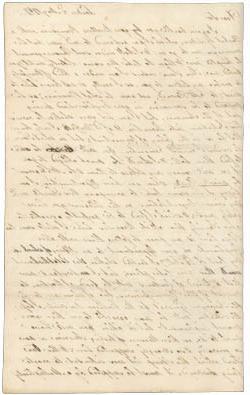Letter from Thomas Whately to John Temple, 2 May 1767
To order an image, navigate to the full
display and click "request this image"
on the blue toolbar.
-
Choose an alternate description of this item written for these projects:
- Main description
[ This description is from the project: Coming of the American Revolution ]
In this letter dated 2 May 1767 English Parliament member Thomas Whately writes to John Temple, the newly appointed Customs Commissioner of Boston. Whately discusses the importance of Temple's position in light of some forthcoming Parliamentary regulations. Whately explains the distinction between the Stamp Act and the upcoming acts (these would eventually be passed in June 1767 and would be known as the Townshend Acts), detailing various types of import duties to be imposed. He also mentions the colonies' attempt at usurpation of the King's power over them.
"you will have much to do"
Thomas Whately, who had previously been a secretary to the Treasury under Lord Grenville, and responsible for drafting the Stamp Tax legislation, is now a Member of Parliament. He sends both congratulations and a friendly warning to John Temple, surveyor general of the customs for the Northern District in America. Temple is about to be appointed a Customs Commissioner in Boston. "You will have much to do," Whately notes, and proceeds to explain why. Parliament is considering numerous ways to replace the lost revenue which the Stamp Act would have supplied, and Temple's new position is directly related to those plans.
Questions to Consider
1. Why does Whately write to Temple "you will have much to do"? (p.1)
2. Without the Stamp Act fund, what are the many ways in which Parliament is now considering raising revenue from the colonies? (p. 2)
3. Why does Whately feel that it is all right to "overwhelm" Temple with "Politicks"? (p. 4)
Further Exploration
4. Can you tell from this letter where the writer and the recipient stand on the relationship of the colonies to the Crown and Parliament? Give evidence to support your points.
5. What was the dispute that involved John Temple, Thomas Whately's brother William, Governor Thomas Hutchinson and Benjamin Franklin? How did a theft, a duel and the loss of a postmaster's job play parts in the story?

